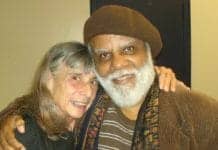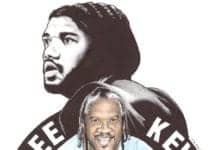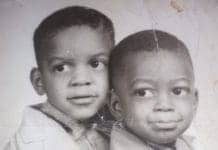
A tribute by Ifoma Modibo Kambon
Editor’s note: This is an excerpt from a recorded conversation with Ifoma about his take on the hunger strikes.
I’m always blessed to share what’s been on my mind with you, whatever’s in my heart with you.
Black Lives Matter to me, in the realest sense possible. You know, with me it’s always “Can’t stop, won’t stop.”
I want to give a salute out to the Brotha Sitawa. I want to give a power salute out to this Brotha here. You know he should’ve been home. And he’s still fighting just to go home.
They have taken too many of our lives in here. It’s time for us – let the brother go home and spend time with his family; he’s not a threat, he’s not coming back here!
I salute him because this Brotha here, despite all the obstacles that existed in Pelican Bay in terms of communication, it was his ability to organize that Hunger Strike, to give it direction and guidance.
It was him who added value and principles to that strike. It was him who came up with the idea of the demands. It was him who was visionary. I salute him, Sitawa, because it was his leadership that made the Hunger Strike possible.
It was him unbroken. He’s an unbroken lion. He’s a part of a generation that came up before us, of fighters – Black Resistance fighters. So, I salute that Brotha.
He is the Hunger Strike!
It was his organizing skills that made it possible for all the other inmates to come together. It was his voice that gave guidance and direction to that Hunger Strike and created the movement, the momentum for that participation.
He is the one who exemplifies the “Can’t stop, won’t stop” spirit, so I salute that Brotha! He is the Hunger Strike!
The only thing that got him is an invention by the Supreme Creator. That Brotha still stands strong, unbroken! His work today remains strong, although he’s in a bad medical place right now. But this Brotha here is still “Can’t stop, won’t stop,” until he takes his last breath.
I salute him! And there’s other Brothers like me who sing his praises. And he understood that it just wasn’t about the individuals, it was about US, US. How can WE, not just a single person, but how WE, together, can bring some form of justice and relief from what they’ve been doing.
It was this Brotha who stood up! And he had decades of standing up as a man and not tolerating the racism and oppression that existed in these environments. It was that Brotha who stood up in the spirit of all those who came before him.
So, we salute him: Sitawa Nantambu Jamaa. To talk about the Hunger Strike is to talk about that Brotha’s skills and what he contributed, more so than anybody.
And although we aren’t necessarily putting anybody on a platform, because with him, when I speak of him, I say “us.” There’s no “I” – it’s “us.” “We” as community. Because he recognized that in order to save himself, he’s got to save all of us.
There can’t be any saving individual selves – there’s got to be the saving of us all. It’s “Can’t stop, won’t stop,” that belief. “We” before “I.”
So, the Hunger Strike to me really represents our history, our history of resistance, our history of putting some value on Black lives; a struggle of justice, of fairness, of equality, where we refused to live on our knees.
And so, while other people got the fame they’re talked about in the books, Sitawa came from generations before him, a Black man who stood up, who valued Black lives.
He stood up in that tradition, that history of being resilient. We got a history of being resilient people that despite all the obstacles, all the oppression and brutality, here I stand, here I rise again.
And he, Bru, he exemplified so much of what it is to be Black, especially in prison; all that he went through as a man just to be and live as a man, as a Black man.
So, the Hunger Strike to me really represents our history, our history of resistance, our history of putting some value on Black lives; a struggle of justice, of fairness, of equality, where we refused to live on our knees.
We stood up enough. We tried so many ways to appeal to their conscience that something was wrong. How do you allow men to just idly live year after year with no hope, no hope?
And he decided enough was enough. Let’s come together. Just like George said: “Settle your quarrels, come together.” Come together and understand that fascism still exists. Put aside your differences. He understood all that.
So, I salute him because it was under those circumstances. If you know what the structure of Pelican Bay is, you really get an appreciation of how he was able to organize that Hunger Strike, when you get massive participation.

But the thing is the day after – you still got the Brothas, the elderly men still standing up fighting; still haven’t abandoned the struggle; still living in the footsteps of those who came before them.
That’s our story. The story doesn’t start in the middle; we always got to go to the beginning. The beginning of the men who died inside these walls, who fought in the spirit of resistance.
We don’t have to go to another land and get a hero to apply to our Hunger Strike. We had the men already in here, who gave their lives for the struggle – the struggle for the creation of a new humanity, of new values and ethics by which men see other men and men see women differently, in a more humane manner, where you really get a sense of what it is to do justice. What they really mean, justice and fairness.
And these men, these men who gave their lives for that cause – Bru Sitawa is a reflection of those principles and ideals.
Send our brother some love and light: Daryel “Ifoma” Burnett, B-60892, CSATF C3-218, P.O. Box 5246, Corcoran CA 93212.

 Store
Store












